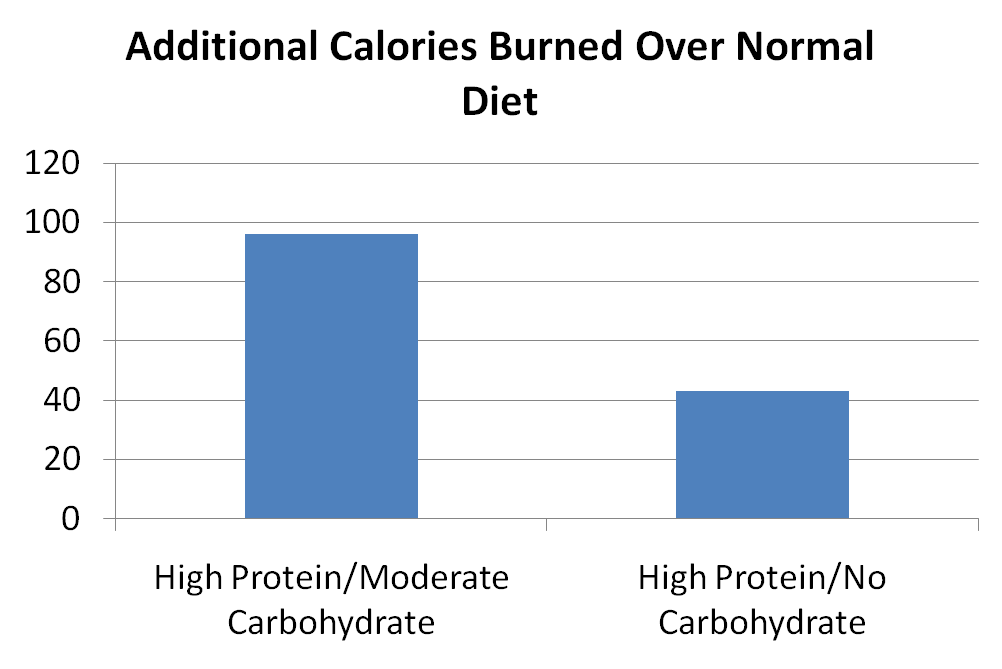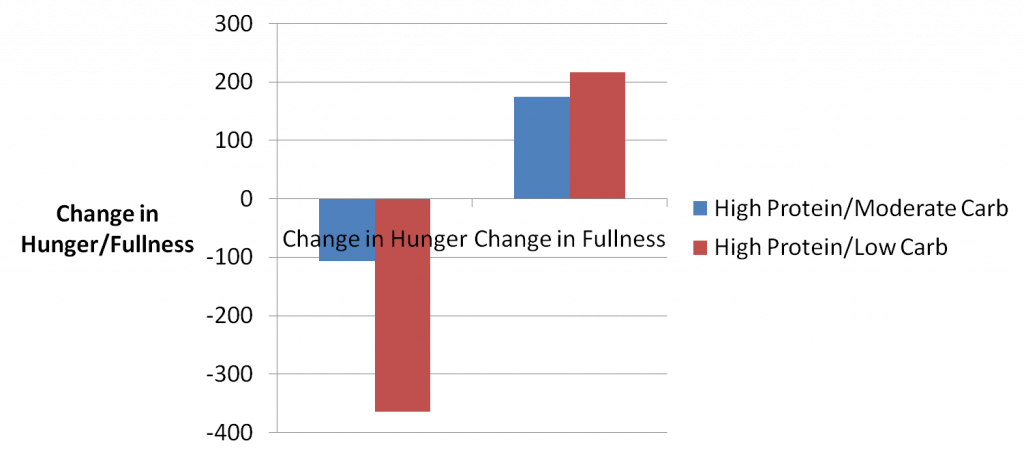The claim of a "metabolic advantage" of low-carbohydrate diets has been tossed around by a lot of people. The idea is that, for a given calorie intake, a diet that gives a metabolic advantage will generate a greater calorie deficit (and hence greater weight loss) than a diet without this advantage. Since there are studies showing greater short-term weight loss on low-carbohydrate diets versus high-carbohydrate diets for a given calorie intake, it has been suggested that low-carbohydrate diets provide a metabolic advantage over high-carb0hydrate diets.
However, low-carbohydrate diets are also usually high in protein. It is well established that increasing dietary protein can increase the number of calories you burn for a given calorie intake. Thus, we know that increasing dietary protein can provide a metabolic advantage. But what about lowering carbohydrate, independent of protein intake? I attempted to answer this question with a meta-analysis that I published back in 2006 (although the research was actually performed in 2004). I concluded that a very low carbohydrate intake (low enough to cause ketosis) provided a metabolic advantage, independent of protein intake. However, I now consider my study unreliable for answering this question, for reasons that I will address later in this article.
The best way to answer this question is through a carefully controlled study, where you manipulate protein and carbohydrate intake independently, and measure the number of calories burned under various combinations. When I did my meta-analysis, no such study existed. Fortunately, we now have a study where this has been done.
The Study Design
Researchers from the Netherlands looked at how the presence or absence of carbohydrate affected energy expenditure on a high protein diet. The researchers recruited 45 men and women and divided them into 2 groups. Each group received two different diets, separated by 4 weeks. One group received a normal diet, and then a high protein diet with carbohydrate. The other group received a normal diet, and then a high protein diet without carbohydrate. The subjects were in energy balance, meaning they were eating just enough calories to maintain their body weight. The diets were as follows:
The subjects ate these diets while staying in a respiration chamber for 36 hours. The respiration chamber allowed for the continuous measurement of the number of calories burned. To mimic the glycogen (a chain of carbohydrate stored in your muscles) depletion that exists on low-carbohydrate diets, group 2 did an exhaustive exercise test before each diet to burn up the glycogen stored in muscle tissue. The researchers also determined the subjects' self-rated feelings of hunger and fullness.
"The Metabolic Advantage"...and The Winner Is...
The results of this study can be seen in this chart:
The researchers found that the high protein, moderate carbohydrate diet increased energy expenditure by about 4%. This translated into an increase of about 96 calories per day. This is in agreement with other studies showing a high protein diet to increase energy expenditure by anywhere from 81 calories per day to 90 calories per day. Thus, we can say that a high protein diet will increase the number of calories you burn by 80 - 100 calories per day when compared to a normal protein diet, and definitely provides a metabolic advantage.
However, the zero-carbohydrate diet did not provide any further advantage over the high protein, moderate carbohydrate diet. In fact, when the zero-carbohydrate, high protein diet was compared to the normal protein diet, the difference in energy expenditure was only 43 calories per day. Thus, the high protein, moderate carbohydrate diet did slightly better. Therefore, a low carbohydrate diet does not provide a metabolic advantage that is independent of the protein intake.
Appetite...and The Winner Is...
The results for hunger and fullness can be seen in this chart:
There was a significant decrease in hunger, and a significant increase in fullness when the subjects were on the high protein, moderate carbohydrate diet as compared to the normal diet. This has been shown in many other studies. This study further confirms that protein can help reduce your appetite. In fact, in one study, a high protein, moderate carbohydrate diet caused a spontaneous reduction in food intake of 1,280 calories per day.
As you can see in the chart, while increased protein reduced appetite, the combination of high protein and no carbohydrate reduced appetite even further. This means that a low-carbohydrate diet can provide an advantage in regards to reducing appetite that is independent of the protein intake. Another study found similar results; in fact, that study found a spontaneous reduction in calorie intake of 294 calories per day over a high protein, moderate carbohydrate diet. Thus, while low carbohydrate diets don't provide a "metabolic advantage" that is independent of protein intake, they do provide an "appetite advantage" that is independent of protein intake. This appetite advantage is likely due to ketosis; one study showed that injection of ketones into the brain of rats caused a reduction in food intake.
Thus, the primary reason why low-carbohydrate diets tend to show superior weight loss in the short-term has nothing to do with a metabolic advantage, or an effect on insulin, or some other magical unknown effect. It all has to do with appetite control. When people consume a low-carbohydrate, high-protein diet, they are getting a "double-whammy" in regards to appetite regulation. They're getting the dramatic benefit of increasing protein, and an additional (although smaller) benefit of a ketogenic diet. The bottom line is that the people on these diets spontaneously eat less....A LOT less.
The Need for an Individualized Approach
One thing about studies in this area is that individual responses tend to vary dramatically. For example, in one study I mentioned earlier, the responses between the low carbohydrate and moderate carbohydrate diets were highly variable, and there was considerable overlap. Thus, while ketosis decreased appetite on average, it didn't help in every individual. This is not surprising, as the control of appetite is a highly complicated, and is influenced by both your physiology, genetics, and psychology. Thus, an effective dietary approach for one individual may not be effective for another; for example, one person may have outstanding results on a low-carbohydrate diet, while another person may do better with a more moderate approach, due to a variety of reasons. This is why there is no "one-size-fits-all" dietary approach for everyone. This is also evident when you peruse various internet message boards regarding various dietary philosophies. You will find success stories and struggles with every approach. Finally, it is evident when you look at the long-term clinical trials of various dietary approaches (including low-carbohydrate approaches), as the amount of weight regained and the failure rates tend to be high with all approaches. Thus, there are no simple solutions to the problem of weight gain and obesity, as there are hundreds of variables all simultaneously interacting to produce the problem in the first place.
A Note About Scientific Integrity
I mentioned earlier about how I now consider my 2006 meta-analysis conclusions to be unreliable. The paper was a good paper for my knowledge level and the available data at the time. However, science is always changing, as newer and more reliable data is collected, and as the knowledge base grows. Any scientist with integrity should be willing to change his mind about an idea, if new information indicates that the old information may have been wrong. I have learned much since the publication of that paper, and my new knowledge now tells me that the paper's conclusions were likely wrong. Among the reasons why I now consider that paper unreliable:
- I treated protein and carbohydrate as independent variables in my analysis. However, because low carbohydrate diets are usually high in protein, the two are not truly independent. This confounds the results of my analysis; regression analysis assumes that your predictor variables are independent of each other. My analysis violates this assumption.
- I incorporated many studies that involved self-report of food intake. It is known that self-report of food intake is unreliable for determining calorie intakes in overweight people. To try to reduce the effect of this problem, I only incorporated self-report studies that had an objective, biological marker that indicated diet compliance (such as urinary nitrogen excretion to estimate compliance with a high protein intake). However, the problem with this is that none of these markers are objective markers of actual calorie intake. Thus, calorie intake estimates could still be considerably off, even if there was evidence of compliance based on another marker. This is a big problem if you're trying to determine if there's a metabolic advantage. If a low-carbohydrate diet offers an additional advantage in regards to satiety, then there would be systematic underreporting among individuals on high carbohydrate diets. This systematic underreporting would show up as a "metabolic advantage" in a meta-analysis.
- I looked at body composition in this paper; however, if you've read my series on body fat testing, you now know that fat-free mass hydration and changes in body water can introduce significant error into measurements. Because low carbohydrate diets have strong effects on body water, this would introduce systematic error when comparing body fat measurements between a low carbohydrate and high carbohydrate diet.
These flaws in my analysis, coupled with the new data from the well-controlled studies I discussed in this article, indicate that my conclusions were wrong.
The Bottom Line
The bottom line is that there is no metabolic advantage to a low carbohydrate intake that is independent of a high protein intake. There is a metabolic advantage to a high protein diet, which will increase the calories you burn by 80-100 calories per day. There is also a dramatic satiety advantage to a high protein intake. A low carbohydrate intake (low enough to cause ketosis) can increase this satiety advantage, but individual responses will vary. The best dietary approach for you will depend upon a variety of factors.




I had this information that lowering the carbohydrate intake loses weight, I went on and I really lost weight, but I felt very hungry, over time I could not stand the diet and I gained more weight. It was good to read this post and it cleared me a lot.
Does the Alfacaps supplement really work? In this article you will see step by step how this supplement works in a weight loss process.
Learn all about Alpha Caps and find out if it really can help you get in shape for good!
show that high protein diets boost metabolism by 80 to 100 calories per day
It is really a great and helpful piece of info. I’m satisfied that you shared this useful info with us.
Please stay us informed like this. Thanks for sharing.
Fantastic. great article
can i sell t shirts on amazon just
began Zazzle but am not certain that is how I
want to sell my stuff.. just not confident.
For some reason, I can’t see all of this text, it keeps disappearing? Are you utilizing something crazy?
Votre manière Méthode de révélateur le tout dans ce paragraphe est vraiment bien ,
tout être capable de facilement simplement savoir , Merci beaucoup .
The next job was to fit a metal plate to the inside of the fire place above the new stove, where the new flu came through a hole cut in the middle to block out the rest of the chimney and stop any of the soot from the old fire falling down into the room in the future; this was sealed around all the edges to finish the lower part of the chimney off (this was later sprayed with black enamel paint). Then it was all systems go for ignition to see how it all worked with a fire burning… Read more »
Les robots patissiers sont generalement dotes -ci peut varier selon les
modeles et les marques.